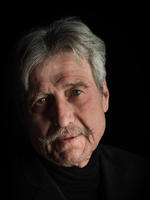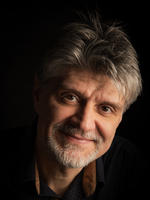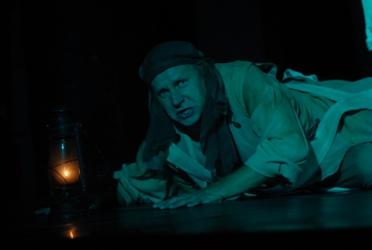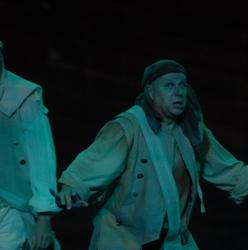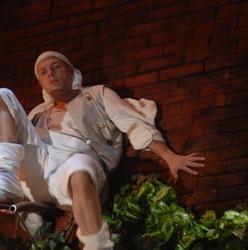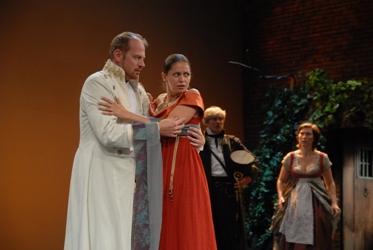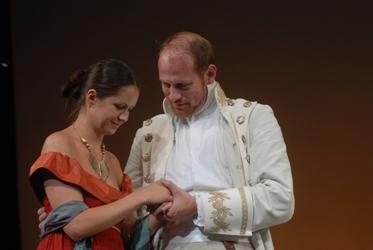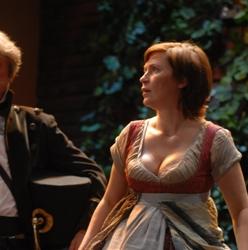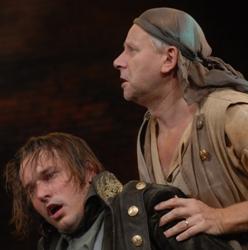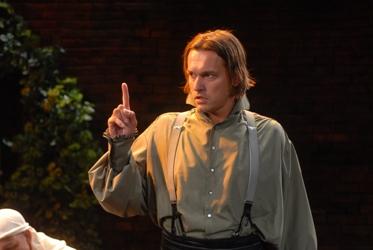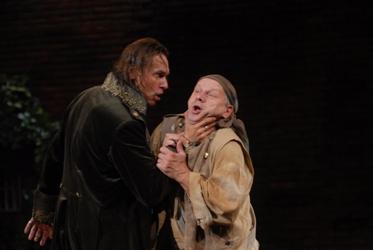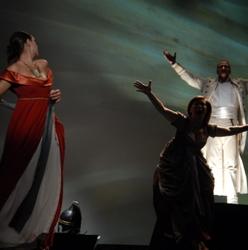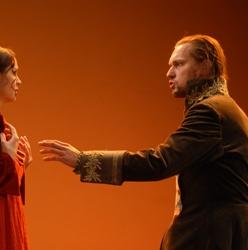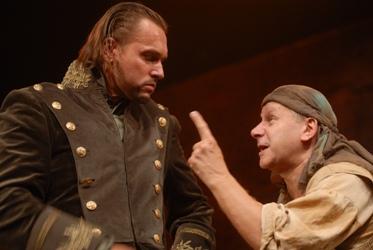From the Baroque to Nebřenský
30. October 2006 zdroj Literární noviny
Vladimír Just started the current theatre season with two trips to Brno, one to Pilsen and the latest one to Český Krumlov. In the meantime he visited several Prague premieres. The strongest experiences - in the good and bad sense of the word - he has reflected in another part of his Theatrical Diary.
In total, three of the newest Czech and Moravian premieres I saw at the beginning of the theatre season concerned the baroque and its stage miracles. Although Heinrich von Kleist is not a baroque dramatist, the way how poetically he retold the antique triangle of philandering Jupiter, the cuckold Amphitryon and his wife Alcmene, so popular in the baroque, and mainly the way how the material was processed by the directress Hana Burešová (Amphitryon, the Brno City Theatre, premiere on 9th September 2006) - these all resembled the Baroque in many things. And not only with the final Jupiter's flying miracle, but with the total stylized atmosphere of constant illusory transformations of identity of figures (the Havel's theme of constant search, loss and faulty finding out of identity, the theme of illusion which is the only respected reality in our world - these all are purely current meanings, dug out of the old text). The suggestiveness of the baroque atmosphere is supported by Vladimír Franz's explosively dynamic music: this component is so equivalent that shifts the Kleist's tragicomedy up to the melodrama. However, the real hero of the night is neither the masterful title hero (Petr Štěpán), nor his somewhat too sculpturesque rival Jupiter (Igor Ondříček) who impersonates him in love scenes with lovely puzzled Alcmene (Ivana Vaňková) - surprisingly, it is Amphitryon's servant Sosias. His astonished buffoonish look at all these confusions of identities, the victim of which he himself is from the beginning, perhaps induces most precisely the current meanings of the work. Jan Mazák after brilliant Papagenos in the Magic Flute proved again that he is no lovely operetta episodist, but one of the greatest actors walking on our stages at present. Let's hope that he will get great dramatic tasks corresponding to his exceptionally plastic talent (he can play the tragicomic figures of Shakespeare, Moliére, Dürrenmatt, Beckett or Bernhardt: I believe that he would play the "big" Goethe's Mefistos in the same unforgettable way as the "small" Havel's Mefistos/Fistula).
Brno Amphitryon: A Classic Which Was a Success
Josef Mlejnek 26. September 2006 zdroj MF Dnes
The Brno City Theatre started the new season with a premiere of Kleist's adaptation of Molière's Amphitryon directed by Hana Burešová. Originally, the German dramatist started to translate the work of the French classic, but a completely different play arose. Its mythological frame remained preserved, Kleist's contribution consists in looking for a human identity inspired by Kant and following the highly mobile frontier between reality and imagination.
Amphitryon's servant Sosias is crossing in spot lights a dark auditorium to inform his master's wife about the victory of his master. He drowns out his fear of darkness with strongish talking - his appearance gives an idea that Jan Mazák will present all the rich register of his comic talent. The scene is made of two walls with an entry door decorated with vine in one of them, several square wells or water tanks are situated on the stage. And only in front of the house Sosias finds the reason of a real fright as he was overtaken by somebody who looked like him! And moreover, he is almost drowned in a well and beaten by a cane by the other self...
Men and Gods
For spectators, Mercury (Viktor Skála) is distinguished with his snow-white gown. The same divine idealizing white colour can be also seen on Jupiter's gown who cloned himself, due to his compelling passion to Alcmene, to the appearance of his husband. Petr Štěpán, acting Perseus's grandson Amphitryon, fights bravely against the "divine" predominance after his return home, his slightly ironic distance does not weaken the cogency of arguments or contemplating about the arisen situation. Igor Ondříček, representative of his supernal counterpart and rival at the same time, is less expressive, but it must be admitted that his leeway is narrower: his best moment is when he discloses unhaughtily to the victim of his trick that he is Jupiter.
In the classic of this kind, servants use to be travesties of their masters, but this time it can be said that the plebeian servant is much more philosophical than his lord who must be mainly shaken with an injured male honour. Jan Mazák was able to intensify the seriously unserious reflexion of his figure with elements of his genuine clownery. Very organically, lively and exactly. Irena Konvalinová, playing the part of Sosias's wife Charis, overshadowed her mistress Alcmene (Ivana Vaňková).
Children? Maybe two
In the conclusion, thundering Jupiter indemnifies Amphitryon and his wife for their disturbed privacy with a prophecy that a fatty baby to be called Heracles will be born of innumerable intercourses with Alcmene, but such indemnification is a little too strong for our autonomous human feelings. It may be why the stage manageress lets two children - a little girl and a little boy with a swimming belt - pass through the stage.
A stroke across the divine calculations? Or just a peaceful "invasion" of our world without gods which need not be without God for that?
To Share a Wife with Jupiter Is Not a Shame
Jiří P. Kříž 12. September 2006 zdroj Právo
We will watch astonished in the Brno City Theatre how Alcmene got with child
It is impossible to not ask the question why stage manageress Hana Burešová did not prefer some well-tried version of Amphitryon, the myth of all myths (Plautus, Molière). Why she digressed from about six dozens of comic authorial versions of Amphitryon to the romantic sprain by German Heinrich von Kleist.
I must state to the author\'s defence that the Kleist\'s version has preserved the comic parts of plebeian Sosias (a singular dramatic opportunity for Jan Mazák) and his wife Charis longing for satisfaction (Irena Konvalinová). Sosias represents an antique chorus at the same time. He explains, accompanies. But he is beaten first of all. By his master Amphitryon and by his own divine double Sosias-Mercur.
Furthermore, Kleist\'s Amphitryon is almost a mysterious drama about a faithful unfaithful woman Alcmene (Ivana Vaňková). Jupiter himself wanted to repose in her womb (Igor Ondříček), but she opposed, so poor Zeus (in Greek, Jupiter in Rome) had to take on the appearance of her husband Amphitryon (Petr Štěpán).
With the assistance of Hermes or Mercur-Sosias (Viktor Skála) it was a smooth sledding then. But Amphitryon is just coming back from a war, so there are suddenly two husbands. This caused a lot of errors, feuds but also remissions; as god is allowed to. The point is really marvellous. Alcmene was fertilized by both and gave birth to twins: the greatest strongman of the Greek mythology Heracles (Hercules), Jupiter\'s son, and Ificles (Amphitryon\'s son). The other is missing in Kleist\'s version.
In other words, an opportunity to a nicely chattering farce from the viewpoint of soap opera authors. But the leitmotif of Kleist\'s version is matrimonial self-sacrifice, if transferred beyond the limits of antiquity, it is in fact an immaculate conception of son of God. With all the romantic pathos and mysterious enthusiasm when an individual is being submitted to an idea. This is also why Burešová, precious formally, stylistically and pictorially, stepped up this time to the romantic stylistic transformation of other theme after relativizing Calderón\'s baroque mystery Devotion of the Cross.
Štěpán (in particular), Vaňková, Ondříček, Skála managed to accomplish the fabular pathos of artwork and direction, intensified by the symphonic, classicist-romantic score with lyric and divinely genteel music motives by monumentalist Vladimír Franz, sometimes intentionally obtrusively melodic. Is that Music of the year 2006?!
Burešová does not deal with a physical likeness of Amphitryons and Sosiases. Thus, nit-pickers who do not understand anything will have something to rebuke for. The look of desires and happiness may be blended with self-delusions if a woman is fascinated and bewitched by heaven. Although, I do not think personally it is a shame to share a woman with Jupiter. Well, I am not a romantic, rather a grim sceptic.
Amphitryon as Drama of Love and Helplessness
Iveta Macková 1. December -1 zdroj Kult
Amphitryon as Drama of Love and Helplessness
Petr Štěpán excelled in the title role as for his acting, moving and expression. Although he had a small dramatic space in comparison to Ivana Vaňková (Alcmene), he was able to use every minute on the stage to his masterly dramatic concert. Moreover, Štěpán, in contrast to the majority of his contemporaries, commands a very intelligible and colourful diction of verses and prose, pleasant to ear. In short, he is an ideal representative of dramatic figures. Vaňková in the role of loving Alcmene enchanted with her look and successful dramatic interpretation, including the recitation of verses. Another dominant figure - Sosias (Jan Mazák), or his interpretation full of gags - made people laugh. Other significant figures were acted by Igor Ondříček (Jupiter) and Viktor Skála (Merkur). The delightful scenic music, completing pleasantly the whole performance was composed by Vladimír Franz. The simple but very impressive scene with indicative functional elements was designed by David Marek, period costumes were made by Hana Fišerová. Burešová’s stage management does not lack drift and suspension.
Kleist's Amphitryon Is Not Just a Rampant Comedy
Vladimír Čech 1. December -1 zdroj Kam
The guest stage manageress Hana Burešová manages the scenes of Amphitryon's and Alcmene's despair to be more dominant than the comic level of the play. As if Burešová wanted to "enter the same river for the second time", as if she would like to continue pointedly the success of Calderón's Devotion of the Cross and use in Kleist a lot of things with which she excelled in the baroque play. Although the directress may oppose this opinion, it is confirmed by at least the expressive dramatic performances without any doubt. Burešová does not void pathos and big gestures, or long monologues as she knows that the local actors will manage them and will breathe in life to the waterfall of words. Kleist a la Burešová does not really rustle with paper, although the almost two-hour performance served in one pull, without an interval, can be a not very digestible bite for somebody. However, it should be remarked that the length of the performance, which is itself rather shorter than longer, is "swelling" with the fact that "one and the same theme is spoken about".
Amphitryon (Petr Štěpán) is a wretch with choleric features. Štěpán presents the desperate lacerated man so convincingly that he provokes compassion. Igor Ondříček as Jupiter, Amphitryon's main rival, need not raise is voice - he is a god who is permitted to do everything. So why to get upset? You will also believe the infatuation of Alcmene (Ivana Vaňková). It is well-known of a lot of performances that Jan Mazák is a good comedian. And as Sosias, Amphitryon's servant, he will convince you again undoubtedly. Irena Konvalinová seconds him excellently and although she plays Charis, Sosias's wife, she preserves a certain feminine gentility. The circle of protagonists is closed by Mercur (Viktor Skála) who torments poor Sosias.
The scene designed by David Marek is dominated with two walls: a brick one with an entry to Amphitryon's palace, the other one is bare so it may sometimes serve to a video projection. Costumes by Hana Fischerová will certainly attract the spectator’s attention. But he may ask why the doubles are dressed quite differently. A layman could say "oh, is Alcmene so blind?", especially if Ondříček is much taller than Štěpán! Maybe, Burešová wanted to stress with these accented differences that deliriousness need not just spring from a visual perception, but rather from the inside, from the aberration of heart or soul.
During the performance, the question may cross spectator's mind to what extent a lie repeated hundred times becomes a truth, as well as the idea that the powerful, or if you like gods, are permitted to do everything and ordinary mortals, including a king, are just toys of their caprices. Such conclusions are also indirectly deduced from the brilliant music composed by Vladimír Franz, reaching the spectator's ears "in the contemplative mist of romantic string quartets". So the new Brno Amphitryon will rather attract a more meditative spectator than the one who would just look for a rampantly wild fun.
Amphitryon
Nora Janečková 1. December -1 zdroj Point
The antique story about Mycenaen king Amphitryon became another theme of a performance of the Brno City Theatre. The story where Zeus disguises himself as king Amphitryon and seduces his wife Alcmene also attracted poet Heinrich von Kleist. Just his version was regarded the most successful by the authors of the performance. Stage manageress Hana Burešová works permanently in the Prague "Divadlo v Dlouhé" (Long Street Theatre) and this is her third performance put on in the Brno City Theatre. The cooperation with her is mainly praised by main protagonist Igor Ondříček playing Zeus and serving as assistant director. "Hana Burešová is very sensitive, she finds out what an actor can offer and she is consistent at the same time, she will not abandon her idea. I like working with her very much," Igor Ondříček says smiling. And that he likes participating in the performance is also proven by the fact that the main female role is acted by Ivana Vaňková. "We are friends with Ivana, we have same opinions on the theatre, so I am pleased that we met again."
The authors of the performance used the translation by Josef Balvín as the first Czech theatre.







